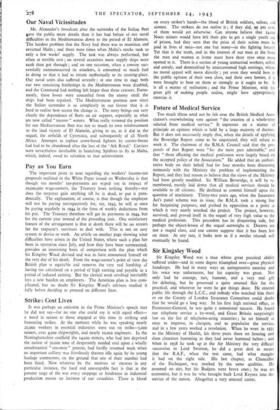Pay as You Earn
The important point to note regarding the workers' income-tax proposals outlined in the White Paper issued on Wednesday is that though ten months' tax-payments are wiped out in respect of ro,000,000 wage-earners, the Treasury loses nothing thereby—nor does the taxpayer gain anything till he is dead, to put it para- doxically. The explanation, of course, is that though the employee will not be paying retrospectively for, say, 1943, he will at once be paying regularly in 1944 in the form of weekly deductions from his pay. The Treasury therefore will get its payments in 1944, but for the current year instead of the preceding year. One satisfactory feature of the arrangement is that at death there will be no arrears for the taxpayer's survivors to deal with. This is not an easy system to devise or work. An article on another page showing what difficulties have arisen in the United States, where such a plan has been in operation since July, and how they have been surmounted, provides an interesting basis of comparison with the plan which Sir Kingsley Wood devised and was to have announced himself on the very day of his death. From the wage-earner's point of view the British plan is equitable and removes the very real hardship of having tax calculated on a period of high earning and payable in a period of reduced earning. But the clerical work involved inevitably lays a new burden on employers.. The American plan is less com- plicated, but no doubt Sir Kingsley Wood's advisers studied it fully before deciding to proceed on different lines.


























 Previous page
Previous page